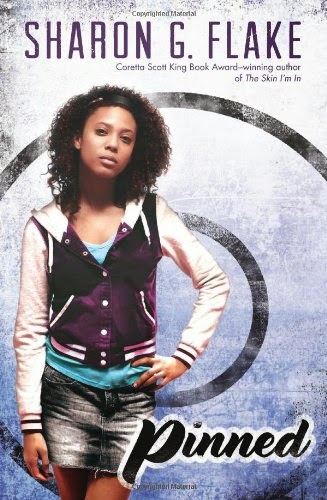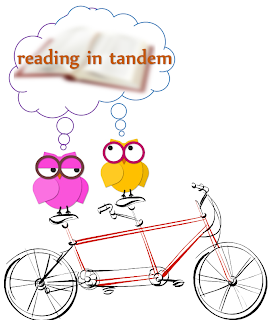 Happy Thursday and welcome back to In Tandem, the read-and-review blog series where both Tanita and I give our opinions, back and forth, conversation-like. Come join our book talk! Today we’re discussing Pinned, by Sharon G. Flake.
Happy Thursday and welcome back to In Tandem, the read-and-review blog series where both Tanita and I give our opinions, back and forth, conversation-like. Come join our book talk! Today we’re discussing Pinned, by Sharon G. Flake.
Pinned is a great fit for us here in Wonderland, with its two complex and indomitable main characters, both of whom expand and redefine the boundaries of ability and disability. It’s also a book featuring characters of color who defy stereotypes in all kinds of ways–Autumn is strong, sure, and the only girl on her school’s wrestling team, while Adonis is in a wheelchair, yes, but also prides himself (and I mean PRIDE) on being the smartest guy in the room. And being Mr. Brainy means he does NOT have time for underachieving jocks like Autumn–even if she has a crush on him the size of Mt. Everest. We found a lot to talk about with this one, needless to say.
Two writers,
& Two readers,
With one book.
In Tandem.
Tanita S. Davis (TSD): The first thing I noticed about this book is that it’s not written entirely in SAE, and I know how much “nonstandard” English bugged people in grad school – we talked a lot about patois and all of that. It has nothing to do with the storyline, on the one hand – but on the other hand, it’s indicative of who Autumn is, so I think it’s a great choice. Readers might have to work to find her state of mind within her tersely truncated speech, I think writers need to write the voices they hear – because it makes the story. Sure, they will get pushback from editors — because editors edit, and they even will edit BAE, which can be touchy, since it’s only somewhat standardized within itself — but I think that EVERYONE needs that realism in voice. It can make the difference between a good story and a great one, and allow the writer to get the correct distance from the narrative.
Sarah J. Stevenson (SJS): I really think the voice strikes a good balance, where it’s easy to read AND to hear, and uses nonstandard English but not to an extreme. (I was just reading a different book in which a character had just WAY too many street-urchin apostrophes for my liking…) I think it IS possible to strike that balance. And I also think it’s really important to portray characters like Autumn, for whom school is not easy because reading itself is not easy. It happens so often, I suspect it underlies a lot of academic issues for a lot of people, but it’s kind of like a “hidden epidemic” because many just muddle through. I like and appreciate that her parents are taking a certain level of responsibility not only for her difficulties but also for helping her through them.
TSD: I really appreciate that there’s talk with and about Autumn’s parents in this book. Educational deficits are often generational… and how many of the teens reading this would know that? I can imagine some of them having an “Ohhhhhhhhh…” moment reading that her parents struggled too — and the biggest drawback from not having that high school diploma is new jobs and moving and new jobs and moving and tearing down and building up over and over, never with enough time to really get anywhere or anything. This novel has that bit of realism that really expands the mind… Certainly if I were a rigid and perfect …twerp like Adonis, it would enlighten me.
My man Adonis doesn’t ask enough questions, methinks.
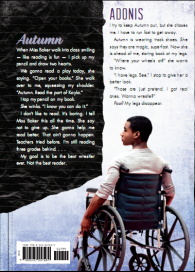 |
| The no-holds-barred back cover on Tanita’s copy. |
I LOVED when he said, “I’m disabled, I’m not weak.” Big cheer, here. I love the cover of this book so much – even though I feel like they got his chair wrong, because that looks like the type of chair in which someone pushes you not in which you push yourself. There’s a difference, and Mr. Adonis wouldn’t be relying on anyone but himself, thank you muchly.
SJS: Agreed–although I have a different cover (it just has a girl on it, in front of a background with two concentric circles that suggest a wrestling ring and kind of also wheelchair wheels, but otherwise no reference to Mr. Adonis. Boo.). But then–I think to myself, who names their kid Adonis Einstein and doesn’t think it’s going to give him some kind of complex? So in certain ways it doesn’t surprise me that he not only isn’t weak, he won’t even admit weakness in any way. Even connecting with others on a human level, for him, is out of bounds.
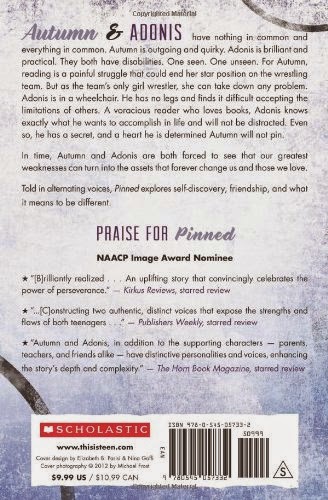 |
| This was the back cover on my copy. |
TSD: The double rings I liked a lot – we have a constant visual reminder of a wrestling ring — Autumn’s home away from home. More subtly, we also have a quiet reminder that this entire book is about wrestling with things – there’s not just ONE level of “hard” here. It’s hard all over.
SJS: Meanwhile, Autumn is someone who wears her heart on her sleeve and can’t help but try to connect, because it’s inconceivable not to. She TRIES, lord how she tries, except, like Adonis, she has this one critical problem: Why would I put an effort into something I’m not good at? They are both hard on themselves; in different ways, with very different manifestations, but neither one can truly accept failure. Adonis, in particular, has trapped himself before others can do the same to him. Problem is, Adonis won’t even recognize the possibility he might ever fail, and Autumn gives her failures too MUCH power over her.
TSD: Oh, AUTUMN is KILLING ME. I’ve crushed on a boy who doesn’t like me before, but this girl is, like, teflon-coated and a super-hero. SHe never lets him get her. He hurts her, she’s momentarily wounded, and then she bounces back up. Words don’t ever not hurt — but if you don’t understand them as well as you could, I think that can help insulate you… ALthough Adonis’ attitude is clear enough — ugh. Snobby punk.
SJS: TOTAL agreement on that so far. Adonis. Puh-lease. Total punk. Autumn is definitely a superhero here. How much punishment can one girl take? It’s his contempt that really infuriates me, and yet that also makes him very human and very much a teenage boy of a particular type.
TSD: I keep wanting her to give up!!!! I ask myself, “is her persistence… normal?” But, then I can imagine JUST this kind of girl; I had a girl who wanted to be friends with me in high school kind of friend-stalk me like that. She was just… so… enthused. And I was just as much of a punk as Adonis, almost. At least I had such nasty thoughts, I hope I wasn’t that rude, but… meh. There was a lot of not answering so I couldn’t be called on my attitude. But, honestly, she kind of scared me. She looked up to me and thought I was AWESOME! with exclamation points and sprinkles. I just… wanted her to … tone it down. To ignoring me.
Hm.
Annoying that I have more in common with Mr… twerp… than I thought.
SJS: I think a lot of us have been in the situation of not-quite reciprocating the enthusiasm of someone else, whether it’s a friendship or a crush. That’s going to be familiar for plenty of readers; I know I’ve been there (and quite possibly I’ve also been the person on the opposite end doing the annoying, as well).
TSD: I find their observations and interactions with their teachers fairly telling, too. Mr. E, always on a diet makes me a bit sad — I hope none of my students knew that about me, but I’m pretty sure they picked up on that. Adonis saying that “so what if he’s fat, he’s smart and nice,” is HUGE. I like that Adonis accepts himself, he is very – well, except for being a full on punk at times – he’s very well-rounded.
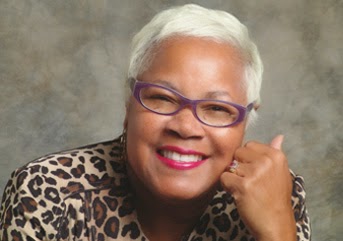 |
| Photo courtesy of the author’s website |
SJS: And yet, and yet–he is socially very lacking because he hasn’t allowed himself to reach out, and doesn’t even acknowledge that it scares him to do so, and that’s what is blocking him when it comes to Autumn. Autumn, meanwhile, doesn’t give up, and that is her core personality trait that will allow her to survive and even thrive. The fact that her teachers support her and want her to succeed–really everyone around her wants her to succeed–makes me glad, too, and makes it clear that sometimes we are our own greatest obstacle.
TSD: Ah, yes. Everyone in this book is their own worst enemy – which seems to be the natural state of human beings. *sigh*
So, Autumn as a wrestler – wow. I wanted to spend more time in that place, in her head. She doesn’t seem to think anything of being a wrestler. That’s not a huge “I’m out of my gender role” thing for her – it seems to be for others, but not so much her. (How much do I love that she BAKES!!) She’s full of being …herself. No dichotomies there, just being … Autumn. I wish the model on the cover would have reflected her body type more – not that she had to be huge, but wrestler girls look like they can take you down a bit! I love how the work it takes to be a wrestler is applied to other things…
SJS: Yes, I find myself really caring about Autumn and what happens to her–I don’t want her to fail, and she is so enthusiastic and kindhearted so good at so many other things that I don’t want this particular set of failures to set her back, to hold her down in that bad place where so many students go who are lost in the cracks. She is STRONG, and she is proud of her strength, and I want to see her claim that again and realize that the same things that make her a good person and a good wrestler and baker can be harnessed to help her in other ways.
As we see over the course of the book, both characters learn in critical ways to accept and be who they are, finding that inner core that means you can let go of the damaging notions about yourself that you thought were true and yet still be YOU. Getting yourself out of a rut doesn’t mean you’re fundamentally changing who you are. For Autumn, she realizes that her real strength is something she’s had all along, and for Adonis–well, HE learns that resilience can be stronger than rigidity. In many ways this is a “quiet” story, in that there aren’t any drastic melodramatic events that suddenly change the course of life forever. But that makes it a very REAL story.
TSD: I looked at the cover, and couldn’t tell what kind of story it would be, going in. I like a lot that Adonis isn’t always… er, praiseworthy. I was with my sister last week in Mendocino; she’s in a wheelchair. And the number of people who spoke to us and smiled at us and gave her a lot of positive strokes – they had her grinding her teeth. People expect the physically-impaired to be founts of sweetness and kindness and somehow inspirational. My sister wanted to push everyone into the ocean for not just letting her be a girl with her sister, just hanging out… she doesn’t like the attention, and for her sake, neither do I. Adonis was a jerk. Just like “regulars,” as he calls them, are allowed to be. I like a lot that Sharon Flake didn’t try to write Adonis into being any less of a stuck-up, weaselly terrified snob than he is – he’s just a guy, wrestling his fears down, like everyone else.
Also? I wasn’t sure at first, but the longer I thought about it, I’m glad Autumn got at least one thing she wanted. She couldn’t explain to anyone’s satisfaction why she wanted it? But… yeah. That was satisfying. There are definitely loose ends – no insta-friendship and just-add-water forgiveness spectacles – time may or may not heal all things, especially with no effort behind it. But those things worth wrestling for? Are achieved. I like this book. I’d give it to a quiet tween or a louder one – because there are two equally relatable characters within.
We both went Full Library on this one, but you can also find PINNED by Sharon G. Flake at an online e-tailer, or at a real life, independent bookstore near you!
